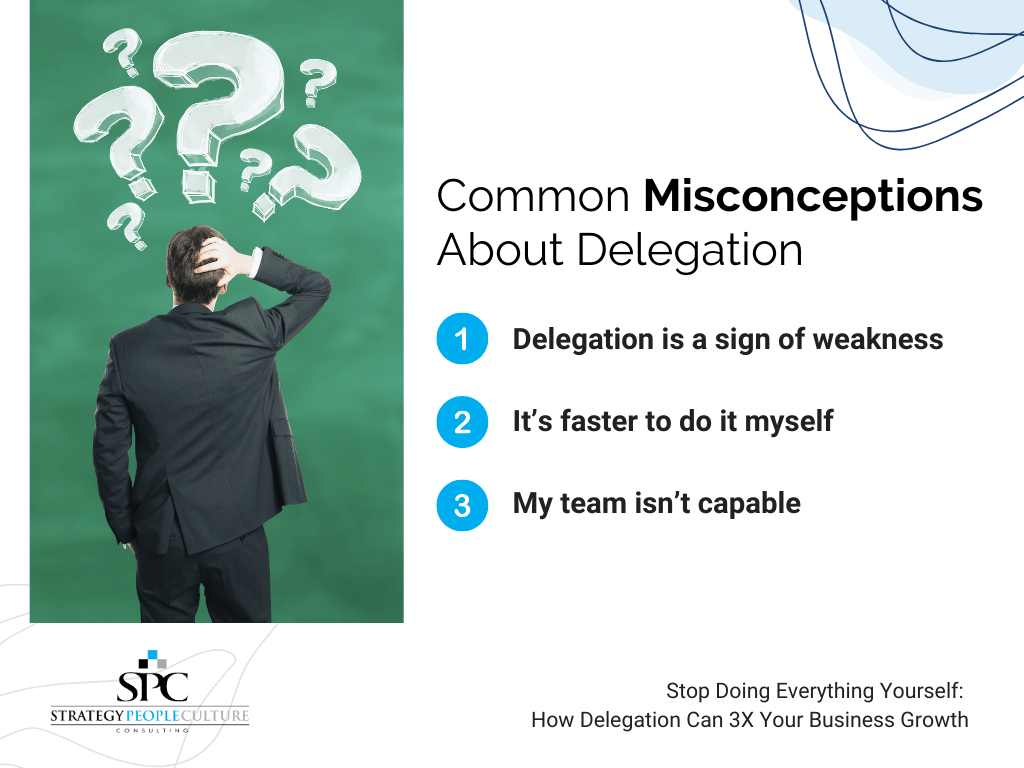Stop Doing Everything Yourself: How Delegation Can 3X Your Business Growth

Imagine having an extra 8 hours in your week. What could you accomplish? Could you strategize on how to grow your business, spend more time with loved ones, or finally tackle that big idea you’ve been putting off?
For many leaders, the thought of having more time feels like a pipe dream. Overwhelming burnout and a never-ending to-do list are the norms. The common culprit? A lack of trust, reluctance, or inability to delegate effectively.
But what if delegation isn’t just about getting tasks off your plate? What if it’s a strategic leadership tool that empowers your team, enhances productivity, and accelerates business growth?
Delegation is not just about freeing up your time; it’s an investment in your team’s growth and your organization’s success. Let’s explore how mastering this skill can revolutionize your leadership and your business.
The Delegation Paradox: Why Leaders Struggle to Let Go
Delegation is often seen as an essential leadership skill, yet many leaders find it one of the hardest to master. This paradox stems from deeply ingrained misconceptions and fears about delegation, which can hold back both the leader and the organization. Let’s dive deeper into the myths, challenges, and mindset shifts required to overcome the delegation paradox.
Common Misconceptions About Delegation

- “Delegation is a sign of weakness.”
Reality: Many leaders fear that asking for help or assigning tasks to others will make them appear incapable. In truth, delegation is a hallmark of strong leadership. Research from Gallup found that CEOs who excel at delegation generate 33% more revenue than those who do not, underscoring its strategic value. - “It’s faster to do it myself.”
Reality: While handling tasks personally may seem efficient in the short term, it’s a long-term bottleneck. A study by Harvard Business Review revealed that leaders who fail to delegate spend more time on tasks that could be handled by others, detracting from strategic priorities. - “My team isn’t capable.”
Reality: Underestimating your team’s potential can stifle growth and innovation. Empowering employees through delegation enhances their skills and confidence, leading to improved performance and job satisfaction.

The Cost of Poor Delegation
Failing to delegate effectively has ripple effects that harm leaders, teams, and organizations:
Burnout and Stress: Leaders who micromanage or take on too much experience higher levels of burnout. The American Institute of Stress estimates that workplace stress costs U.S. businesses over $300 billion annually in lost productivity, with overworked leaders contributing significantly to this figure.
Reduced Team Productivity: Teams that lack clearly defined roles and responsibilities tend to operate with reduced efficiency and effectiveness. When individuals within a group are uncertain about their specific tasks or how they contribute to the overall goals, it can lead to confusion, overlapping efforts, and even conflict. Without well-established roles, team members may not fully utilize their skills or expertise, resulting in a decrease in productivity and morale.
Hindered Employee Development: Employees who are not entrusted with meaningful tasks often find themselves in a position where personal and professional growth is stunted. When individuals are assigned mundane, repetitive tasks that do not challenge their skills or creativity, they may become disengaged and feel undervalued. This lack of responsibility can lead to a sense of stagnation, preventing them from developing valuable competencies that are essential for career advancement. Furthermore, the absence of meaningful work can diminish motivation and job satisfaction, leading to higher turnover rates within the organization. By failing to provide opportunities for meaningful contributions, companies not only risk losing talented employees but also hinder their overall productivity and innovation.

The Psychology Behind the Delegation Paradox
At its core, the reluctance to delegate often stems from psychological barriers:
- Perfectionism: Leaders with perfectionist tendencies believe no one else can match their standards. This mindset stifles team innovation and creates a dependency on the leader.
- Fear of Losing Control: Delegation requires leaders to trust others and relinquish direct oversight, which can feel risky. However, trust fosters empowerment, which is essential for long-term growth.
- Ego and Identity: Leaders sometimes tie their value to how much they personally accomplish rather than what their team achieves collectively. This mindset limits their ability to scale their impact.
The Benefits of Effective Delegation
Effective delegation transforms leaders, teams, and organizations. Here’s how:
For Leaders: Reclaim Your Focus

- Focus on Strategy: To reduce burnout and maintain mental well-being, it’s essential to lighten your workload whenever possible. Prioritizing tasks and setting realistic goals can help create a more manageable schedule and promote a healthier work-life balance.
- Achieve Work-Life Balance: Lighten your workload to reduce burnout and maintain mental well-being. Finding balance in your responsibilities can enhance productivity and foster a healthier mindset.
- Strengthen Leadership Credibility: When leaders assign important tasks, they demonstrate their confidence in their team’s abilities, fostering a sense of trust and responsibility.
For Teams: Empower and Engage

- Boost Team Morale: Delegation helps in fostering a positive work environment where team members feel valued and motivated. By encouraging collaboration and recognizing achievements, teams can enhance productivity and overall job satisfaction.
- Develop Skills: Employees gain hands-on experience that enhances their capabilities and career prospects, equipping them with practical skills that are invaluable in today’s job market. This exposure not only boosts their confidence but also makes them more competitive candidates for future opportunities.
- Instill Responsibility: When team members feel a stronger connection to their work, it not only boosts their motivation but also fosters a sense of accountability among them. This deeper engagement leads to improved collaboration and better overall results for the team.
- Drives Innovation: Empowered teams are more likely to contribute creative solutions because they feel a sense of ownership over their work and decisions. When team members are encouraged to share their ideas and take initiative, they are more motivated to think outside the box and explore innovative approaches. This collaborative environment not only enhances creativity but also leads to improved problem-solving and greater overall success for the organization.
- Builds Confidence: A study in the International Journal of Economics and Business Administration found that delegation reduces power distance and boosts self-confidence, leading to better task performance.
For Organizations: Drive Growth and Innovation

- Maximize Productivity: Assigning the right tasks to the right people improves efficiency by ensuring that each individual’s strengths and skills are utilized effectively. When team members are matched with responsibilities that align with their expertise, it leads to higher productivity and better overall results. According to the 2018 State of Leadership Development report by Harvard Business Publishing, organizations that prioritize leadership development see greater success in transformations.
- Encourage Creativity: Teams are empowered to make decisions and contribute fresh ideas and innovative solutions, fostering a collaborative environment that encourages creativity and open communication. This collective approach not only enhances problem-solving but also drives the organization toward achieving its goals with increased efficiency and enthusiasm.
- Increase Retention: Employees in organizations that prioritize strong delegation practices not only feel more valued and empowered, but they are also significantly more likely to remain committed and loyal to their workplace. This positive environment fosters greater job satisfaction and retention among team members.
- Multiplies Leadership Impact: Leaders who delegate can focus on high-level strategy, amplifying their influence and driving organizational success. As John Maxwell famously stated, “If you want to go fast, go alone. If you want to go far, go together.”
Overcoming Delegation Challenges

Delegation is not without its challenges. Even seasoned leaders face barriers to delegation. A study published in the Journal of Managerial Psychology explored the outcomes of delegation from the perspectives of leaders and subordinates. The findings revealed that while delegation can lead to higher levels of perceived leader ability and performance, it also requires careful consideration of the team’s readiness and the leader’s support to ensure positive outcomes.
Reframing Delegation as a Leadership Tool
To overcome the delegation paradox, leaders must shift their perspective and recognize delegation as a tool for empowerment and growth. Here’s how:
- Assess & Select Tasks: Use tools like the Eisenhower Matrix to identify tasks that can be delegated. Focus on those that are time-consuming but not high-level.
- Choose the Right Person: Match the task to the team member’s skills, experience, and development goals.
- Communicate Clearly: Provide detailed instructions, expectations, and deadlines.
- Provide Resources & Support: Equip your team with the tools, authority, and guidance they need.
- Monitor & Provide Feedback: Track progress without micromanaging. Offer constructive feedback and celebrate wins.
Bonus: Use practical tools like delegation checklists, project management tools, or progress trackers to simplify the process.
Bridging the Gap
The delegation paradox can be resolved by recognizing that effective delegation is not about relinquishing control but about sharing responsibility. Leaders who embrace this shift unlock the full potential of their teams and organizations, paving the way for sustainable growth. By dispelling misconceptions, understanding the costs of poor delegation, and reframing it as a strategic advantage, leaders can transform their approach and achieve remarkable results.
Effective delegation is a game-changer for leaders who want to scale their impact and drive business growth. By empowering your team and strategically redistributing your workload, you’ll not only free up time but also foster a more motivated, capable, and innovative organization.
Looking for more guidance? Explore our executive coaching programs to develop delegation skills that lead to long-term success. Let’s empower you to be the leader your team needs, unlock their potential, and watch your business thrive.
